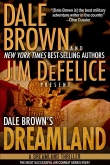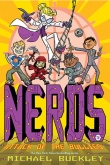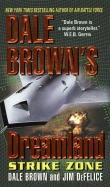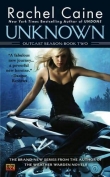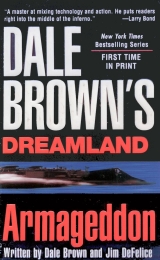
Текст книги "Armageddon"
Автор книги: Dale Brown
Жанр:
Боевики
сообщить о нарушении
Текущая страница: 17 (всего у книги 20 страниц)
But there was plenty of time to worry about that. McKenna decided there was no reason not to see what the plane could do. She gave her instruments a quick sweep, checked her altitude and the air around her, then pulled the throttle to afterburner.
* * *
“MIG IS OFF,” THE HELICOPTER PILOT TOLD DANNY.
“Pick up our guys,” Danny said, though the command was unnecessary—the pilot had already whipped the Quick Bird toward the hangar area.
“Danny, I have an update from the Malaysian air base,” said Jennifer. “They’re taking heavy fire. The command trailer has been hit by mortar fire. One Megafortress took off. Another is on the ground. They think it got hit. Colonel Bastian is overdue as well.”
“They asking for assistance?”
“They’ve radioed out to a Malaysian unit in the area. They didn’t get a response.”
Danny leaned back in his seat. Besides the length of time it would take to get there—upwards of an hour, if not more—they didn’t have the fuel.
“We’re ready to blow hangar one, Cap,” said Liu, breaking in. One had the Sabre and the Hunter, which McKenna has said were the most likely planes to be used. “Charges are set”
“All right, Jen, I’ve got a few things to attend to here. I’ll get back with you”
Danny was about to give Liu the okay to blow the planes when he saw the fuel truck on the tarmac near the hangar.
“Can we use their jet fuel?” Danny asked the pilot.
“We can use standard jet fuel, if that’s what it is,” said the pilot.
Danny clicked into the Dreamland circuit, asking Liu if he knew what sort of fuel he’d pumped into the plane. Liu had no idea. He then switched and spoke by satellite to Dreamland Command, where Major Catsman promised to get a fuel expert on the double.
“If I can smell it, I can tell if it’s okay,” said the chopper pilot while they waited.
“You sure?”
“Look, jet fuel’s jet fuel, right?”
Danny looked around the airport. The only terrorists who had been nearby were either dead or hunkered over by the civilian side of the facility. If he could refuel here, he could fly the helicopters down to the Malaysian base.
Just one helicopter. He didn’t want to leave the platform unprotected.
“Whiplash Commander, this is Dreamland Command.”
“Freah”
“Danny, I have the man who tuned the Quick Bird engines on the line here, speaking from his quarters.”
“Bottom line it, Major.”
“Bottom line is you’ll blow the warranty if you use commercial jet fuel—yeah, it’ll work.”
“Thanks”
Pandasan coastal patrol base, Malaysia (north of Brunel)
1243
Dazhou Ti tightened the grip on the pistol as he strode across the dock to the wooden plank that had been thrown over to the side of the ship by his boarding party. He could feel the beat of his blood pulsing in his head, everything a rush. One of his men stepped across the deck as he came onto the ship, saluting smartly.
“The captain is in the bridge,” said the sailor.
Dazhou nodded and continued through the hatch into the ship’s superstructure, aware that he was being watched, aware that his course now was set and irrevocable. He went up to the bridge, where his men held the captain and another officer at gunpoint.
“You are with us, or you will die,” Dazhou told the captain, pointing his pistol at the man.
The ship’s captain had served under Dazhou two years before on the Perkasa, a coastal patrol ship. Until this moment he might even have considered himself a friend, though Dazhou had not included him in the inner circle of navy personnel who had worked with him on the Barracuda.
“I don’t know what you mean,” said the captain.
Dazhou pressed the pistol against his cheek. “I would think it would be clear enough.”
“I am with you, of course, Captain,” said the man. “But your aim—I don’t understand.”
“We are going to assist the forces that have taken over Brunei,” said Dazhou. “There is an American force attempting to help them. We will attack them, and then we will find other targets.”
“But the government has decreed that we honor our treaty obligations.”
“You are very brave,” said Dazhou.
Then he pulled the trigger.
As the captain’s body fell to the ground, blood coursing from his skull, Dazhou turned to the other officer. The man stood in shock; he did not appear to be breathing.
“Where is the ship’s intercom?” Dazhou asked.
Without saying a word, the man went to a panel at the side and held up a microphone. Dazhou took it.
“This is Captain Dazhou Ti. I have been commanded by God to take over this ship to join in a holy war against the western devils who rule Brunei through the bastard sultan and his family. It is a holy war and the rewards of those who truly believe will be eternal and guaranteed. Any who do not wish to join us may leave the ship in five minutes. After that, we will set out.”
Allowing some to leave was a calculated risk. The ship’s complement was fifty-one; it could be operated with less, but most of the twenty-three sailors Dazhou had brought with him were not familiar with the ship and it would be difficult to operate it if everyone aboard deserted. On the other hand, the appeal to faith—and a religion that Dazhou himself did not share—put the argument to join him in its starkest, most obvious terms.
He handed the microphone back to the other officer. “You too may leave,” he told him.
“I am a believer. I stay”
Dazhou nodded, then turned back around. Blood still poured from the captain’s head.
“Throw him overboard,” he told his men. “Then report to the second officer. We have much to do”
North of Meruta
1243
Dog crouched on his knee behind the tree, watching as something moved about thirty feet ahead through the brush. There was no doubt in his mind that it was the terrorist, but he could not actually see the man. He had the rifle wedged against a shoulder. He cocked his head down so he could see through the scope; the sweat on his palm made the M4 feel oily and he pressed his fingers tighter.
A white rag appeared in the middle of the scope.
Was the man surrendering?
He raised his head, saw only a blur. He was only twenty feet away at most. He had a rifle in his hand.
The white was the shirt he was wearing.
Dog put his head down again, his eye on the scope.
He’d lost his target!
Dog pushed the barrel to his right but couldn’t find his enemy. He brought the weapon down, scanning to his right—something moved dead ahead of him. He saw a white swatch, then a face, pushed his shoulder against the weapon and fired.
The gun popped in his hands, the recoil easier than he thought. He swung right, saw something much further away but hesitated, not sure exactly what it was. Finally he saw a rifle with a banana clip against a white background through the leaves and fired. This time he saw that he had hit what he was aiming at; it furled backward, falling to the ground.
Something cracked behind him. Dog swung around, nearly losing his balance. A white shirt loomed in front of him.
He fired point blank into the man’s stomach. The bullets didn’t seem to affect the terrorist at first. He continued fumbling with the AK47 in his hands, having trouble making it shoot. Dog fired again, still at point blank range.
A bulletproof vest!
Dog started to aim higher, but just then the terrorist began to dance—it was the only way to describe what Dog saw, a kind of macabre shake and jump, a turn to the left and then to the right, as if the man were trying belatedly to duck away from Dog’s gunfire. He shook his shoulders, and then the gun dropped from his hands and he fell off to the side, confusion on his face.
Dog started to stand. As he did a shout made him lose his balance and he toppled forward, just in time to hear three short bursts of automatic rifle fire. To his right. Lang burst through the leaves and stood over him, firing again. Dog pushed himself back to his knees but Lang held him down, crouched over and scouting the nearby jungle.
“All right,” said the soldier, tugging him to follow. Dog stumbled and then started to run, moving sideways as well as frontward as they tracked toward the road. His feet sloshed in a wet spot and he nearly fell, but somehow he managed to keep his balance until he reached the road’s shoulder. His elbow and shoulder broke his fall and he rolled onto his stomach.
“It’s all right, we’re clear,” said the soldier from his haunches a few feet away. “Cross the road. We’ll move down the ditch there. There’s a little cover.”
Dog glanced to his left, then scrambled over the macadam and got into the vegetation. He started to relax, then realized he should be covering Lang’s crossing. He got up and watched as the soldier made his way across the roadway very deliberately.
It wasn’t that he went slowly, just that he was under control. Unlike Dog, he’d have been able to react and fire if anything had appeared.
“Let’s duck through this run of trees,” suggested Lang. “Then angle back.”
They began trotting through the jungle, going several hundred yards west before angling back in the direction of the road and the village they had visited earlier. When they had the highway in sight, they stopped to catch their breaths. They couldn’t hear anyone following.
“Good going back there, Colonel,” said Lang.
“Good going to you, too.”
“You want to give that little radio a go again or what?”
“Yeah” Dog took it from his pocket and put it back on voice, making another broadcast. After several more tries, he, gave it up, slipping it back to beacon. The battery was limited, but Dog figured that there was no sense trying to conserve it; they’d either be saved or dead by the time it ran out the way things were going.
“Nobody home, huh?” said Lang.
“Not yet.”
“We’ll just have to take care of ourselves, that’s all. You think we should head back to the village?”
“I think that’s a better idea than staying here”
“Maybe, maybe not,” said Lang. It was the first time since they’d met that he’d expressed anything close to doubt, and Dog felt instantly uneasy.
“I don’t like to sit when I can be moving, if you know what I mean,” added the soldier. “I say we move”
“I agree,” said Dog.
“All right, let’s move out then. But listen, Colonel, no bullshit now—you get tired, you tell me, okay? I mean, no offense, but you got to talk up if you’re tired”
Under other circumstances, Dog might have been insulted—or even touched. But now he just shrugged. “Don’t worry about me. And you can call me Dog”
“Yes, sir,” said Lang, getting to his feet.
Aboard “Penn,” over Malaysian air base
1243
Zen launched the Flighthawk and hastily tipped its nose down in the direction of the mortars. The radar beeped as it picked up a shell, and C³ began a quick set of calculations to determine not only the precise launch point but the best angle for an attack.
“Bree, I have a target.”
“I just need some altitude so I can launch one of the air-to-ground missiles,” she said.
“If there’s anything left of them when I’m through,” Zen told her, accelerating into the attack, “you’re welcome to them”
The terrorists had set up a pair of large mortars roughly three and a half miles from the base. Five men were working the two tubes, which were either 81 millimeter British or 82 millimeter Russian weapons, in both cases old but reliable and potentially devastating weapons. The guerillas had a van just to the north of the clearing as Zen approached. He put the Flighthawk’s nose onto the firing team on the left and pressed his trigger, working in a diagonal through the mortar area and into the van. His first shots missed both the mortar and the men serving it, but the vehicle exploded almost immediately. By the time he turned off it was engulfed in flames.
He came back and looked for another target beyond the thick cloud of black smoke. A long dirt road ran through the jungle toward a paved road to the west; Zen followed along it but saw nothing. He saw a reflection from a ridge to the north as he turned and headed toward it, guessing that there was a spotter using binoculars there. Sure enough, he saw figures scrambling and caught the outline of a gun in the magnified viewer. Zen pushed down to fire at them but by the time he got in range they had ducked away; he pounded the ground with shells but it was like trying to hit a flea with a spitball.
“Ground is reporting that they’re no longer under mortar attack,” said Breanna. “They have about a dozen guerillas trying to fight their way in from the southwest, near the end of the strip. They’ve radioed to another Malaysian unit for support. No response yet.”
“Yeah,” said Zen. He climbed back in the direction of the air base. “If you can get them to mark the position, I’ll make a pass with the cannon.”
“The guerillas are in white and they’re coming up the ravine,” she said.
“Yeah, yeah, I see them,” said Zen. He pushed the Flight-hawk’s wing down, swooping into a wide arc to the far side of the ravine the enemy was using for cover. Zen walked the Flighthawk down the ditch, working the cannon back and forth.
“Zen, can you do that one more time? They want to use you as cover for a counterattack,” said Breanna.
“Hawk leader,” he confirmed, pulling back around and repeating his run from the opposite direction. He could see movement on both sides of the ravine but concentrated on the ditch itself, which had ten or twelve soldiers in it.
“You talk to Alou?” he asked Breanna.
“Negative.”
Zen’s path brought him over the airfield. He could see the other Megafortress at the end of the runway. Part of its right wing had been chewed off by an explosion and the nose had been mangled. The plane rested on its belly.
“Zen, I’m picking up a distress signal on the UHF band,” said Breanna.
“Yeah,” he said as the chirp flooded over the circuit. “Did Indy get off the field?”
“I don’t think so,” she said. “Stand by. Let me see if I can track it down.”
Zen spotted someone moving near the aircraft. He hoped they’d gotten out and the signal was just a glitch.
“I have the source three and a half miles south of the base,” said Breanna. “I’m marking it. Ground’s asking for more support back by that ravine”
“Roger that,” said Zen, pulling the Flighthawk around.
Malaysian air base
1254
Starship didn’t realize that Kick had stayed back near the plane until the gunfire had nearly stopped. One of the Special Tactics people had found a medical kit and was trying to clean and bandage Starship’s arm, which he’d bashed up pretty badly somewhere along the way.
“I’m okay. I have to go back and get my friend out,” Starship told him. “I’m really all right.”
“Just hang on until the area’s secure,” said the air force special operations soldier.
“Yeah, okay,” said Starship. But he stood up and started moving toward the aircraft anyway. He saw a Flighthawk whip overhead and unleash its cannon. The sight locked him in place; he watched the small aircraft whip upward, disappearing in a blink of an eye.
“Kick,” he said, moving again toward the plane. “Kick!”
The joints in his knees were so unsteady he wobbled from side to side as he reached the wing of the giant plane. He hauled himself up, using the Flighthawk to get a boost, and then ran up along the top of the big plane. He navigated around the hatchways to the rear compartments and threw himself down to peer inside the opening over the pilot’s seat.
Major Alou stared up at him, his face a macabre death mask. “I’m sorry,” he told Alou.
He looked to the right but didn’t see Kick. “Kick! Kick! You asshole!” he shouted to his friend. “Get the hell out of there! Kick! What are you doing?”
He thought he heard Kick’s voice behind him somewhere. He looked around but didn’t see him. There was another shout, and he crawled to the side of the plane.
“Lieutenant, you better get off that plane,” shouted the Air Force Special Tactics soldier from the edge of the runway. “You’re an easy target up there”
“My friend—Kick, the other Flighthawk pilot. He went back inside.”
“No, sir, he’s down here”
“He is?” Starship climbed down the front of the smashed up windscreen and bashed nose, jumping to the ground. His knees gave way and he crumpled in what seemed like slow motion. As soon as he hit the ground he rolled back up and started to run to the side of the field.
“Kick, Kick, you idiot, where the hell are you?”
The Air Force Special Tactics soldier caught him from the side with his tree trunk arm.
“Lieutenant. Your friend—”
Starship turned and looked at him. The soldier shook his head. Starship shook his head as well.
“He can’t be dead. I pulled him out,” said Starship.
“I think he was dead when you pulled him out,” said the man. “Listen, we have to fall back to the bunker area until reinforcements come in. We don’t know how many more of these bozos are out there in the jungle. We’re down to six guys who can handle a weapon, not counting you and me.”
“I can’t leave Kick,” said Starship. “Where is he?”
“Sir, you’re going to have to leave him,” said the soldier. “Or you’re going to be dead, too.”
“He can’t be dead.”
“This way,” said the sergeant, starting to trot up toward the bunker.
Starship stared after him for a moment. Then, against his conscious will, his legs propelled him to follow.
Southeastern Brunei
Exact location and time unknown
The man with the gun prodded Mack down the pathway past a cluster of small houses to a turnoff that led to a long wooden platform above the slope. At the far end of the platform sat a small building constructed from chipboard. Inside, Mack found several women holding or sitting with children on the floor of the single room. The far wall was a screen overlooking a rock-strewn slope down to the stream Mack had walked along earlier. A man with a pistol stood in front of the screen; he glanced nervously at Mack as his escort left him, then went back to watching out the side.
Unsure of the situation, Mack decided that his best course for now was to say nothing until he could puzzle out whether the men with the guns were terrorists who had invaded the settlement, or if they were the husbands of the women trying to protect them. But no one said anything, either to Mack or each other, outside of an occasional soft whisper to children who were fidgety.
“Are you for the government?” asked Mack finally. No one answered.
“Sultan?” he asked. But that didn’t draw a response, either.
“U.S.A?”
Nothing.
“Could I have some food?”
Still nothing. Mack propped his hands on his knees and leaned forward, baffled by the situation.
North of Meruta
1348
Dog heard the whispery jet engine approaching from the north and realized it had to be a Flighthawk. He pulled the PRC radio from his pocket and switched it to voice.
“Colonel Tecumseh Bastian to Dreamland Flighthawk. You’re approaching my position,” he said.
The only response was static. Dog cupped his hand over the earphone as he broadcast and listened again.
“Dog, this is Zen. I should be just crossing overhead,” said the pilot finally.
“Yeah, I see you,” said the colonel as the black dart came overhead. “We were ambushed further up on the road. The terrorists got one of our guys.”
“I saw the Hummer. Danny is en route with a helicopter.”
“Danny?”
“He’s about fifteen minutes away. Pilot wants to claim a new speed record for an A-6,” said Zen. The transmission crackled and faded but then came back. “Can you find a good place for him to land?”
“Plenty of roadway,” said Dog.
Zen said something, but it was wiped by static. Dog asked him to repeat it but didn’t get an acknowledgment.
“You’re talking to the plane?” asked Lang, coming back. “Yeah. They have a helicopter en route. It’s about fifteen minutes away”
“We have to keep moving,” said the soldier. “They’re only a few hundred yards behind us, on the other side of the road”
“You sure?”
“Yeah. They’ve been following all along and now they’re starting to catch up. Come on”
Dog started to tell Zen that they were being pursued. He got only two words out of his mouth when the by now familiar rattle of an AK47 sounded through the nearby jungle.
Aboard “Penn,” over Malaysia
1352
“I didn’t get a good location,” Breanna told Zen. “I think his battery’s dying”
“They may be under fire,” he told her. “I see something popping down there. Something’s going on”
She flipped on the feed from the nose of the Flighthawk and watched as the small robot made a tree-top pass over the road. There was a flash off the right wing, but the robot plane went by so quickly it was impossible to tell exactly what had fired at it.
“I’d try raking the trees with the gun,” said Zen. “But I just can’t tell where they are”
“I have a better idea,” said Breanna. “Let’s show them we’re here and maybe they’ll back off.”
“Bree, they may decide we’re a good target—” said Zen, but she’d already started the aircraft downward. The Megafortress cleared the treetops by maybe five feet.
“Trying to break their eardrums?” Zen asked as she climbed.
“If it’ll help,” she said.
Southwestern Brunei, near the Malaysian border
1352
McKenna put the MiG-19 into a steep descent and got ready for her landing. She had to bleed off speed but keep the engine up in case she blew the approach in the unfamiliar plane; even a veteran MiG pilot could find the combination challenging on a rough field. The tiny runway came up quickly in her windscreen as she descended; she glanced at the dial tracking her engines’ rpms, making sure she had enough power to abort if necessary.
The MiG’s air speed plummeted from 325 knots to just over 200 as she dropped toward the hard-packed surface at the edge of the runway. Her flaps were open all the way and she was committed now. The craft sank abruptly, threatening to pancake. She got past it, the tail twitching slightly but her nose right, flaring up so the plane could help itself slow. But she reached prematurely for the throttle to throw it into neutral—a minor mistake in another plane, a potential catastrophe in the MiG-19 on a short runway. Cutting the speed so sharply caused the back end of the plane to slip downward abruptly once more, this time perilously close to the ground. She felt her heart thump, and then in the next instant felt something kick her from behind—her father, she thought, telling her not to be a jerk.
That was all it took. She managed to get the rear wheels down solid without scraping her butt on the runway. With her nose still up to increase drag, her speed quickly fell; when she slipped under 130 knots she dropped the front of the plane and went for the brakes and chute and brakes.
And brakes and brakes and brakes. She stopped with her nose over the end of the field.
“Never a doubt,” she said as she climbed out of the plane.
“My MiG!” exclaimed Prince bin Awg, materializing from the back of the crowd that ran out to greet her.
“She’s a beauty,” said McKenna.
“How did you rescue her?”
“She kind of called to me,” said McKenna.
The prince looked at her, then smiled. “For your bravery, you deserve a present.”
“I’ m not much for medals, Prince,” she told him. “Besides, it was mostly the Dreamland people. The terrorists made a move to the Megafortress and they decided they had to keep her on the ground. They took her rear stabilizer off and wiped out the fuel truck they’d brought in from outside the city somewhere”
“The Megafortress was destroyed?” asked the prince.
“Temporarily disabled. They blew the back section of it off. It’ll fly again someday”
“And my planes?”
“I saved this one,” said McKenna. “Best I could do.”
The prince nodded grimly, as if lamenting the passing of a dozen old comrades—which in a way he was. “You deserve a reward,” he said. “It is yours.”
“What is?”
“The MiG.”
“Really?” McKenna looked back at it. “No kidding?”
The prince looked at her solemnly. “My uncle owes you his life. I would give you twenty such planes”
“I’ll settle for this one and a new set of brakes,” said McKenna. “Mind if we get some grub? Those Dreamland people were nice, but the only thing they had to eat were MREs. One more peanut butter and jelly sandwich in a tube and my stomach would have hit the eject button.”
Brunei International Airport
1352
Sahurah watched as the men pulled the last of the metal from the wrecked hangar entrance. Two of the hangars at the prince’s side of the airport had been completely destroyed, but only the doorway to this one had been blown up. A large aircraft sat untouched a few yards away.
“It may be of use,” said Yayasan, the pilot who had deserted from the sultan’s air force. “It hasn’t been used often, but it was flown recently. The Russians called it a Tu-16. The Western nations referred to it as a Badger. This model was used for maritime patrols, and some bombing.”
“Could we use it against the sultan’s forces?” asked Sahurah.
“Certainly. There are machine-guns, those racks are there for bombs or missiles. Missiles, but we could use bombs.”
“Can you fly it?”
“I have never done so.”
“That is not my question.”
Sahurah looked into the pilot’s face, filled with fear. Sahurah knew from his own experience how difficult a foe fear was. He wished he had the ability to inspire others to face it, but realized he did not. Sahurah turned and started to walk away.
“I will try, Commander,” said the pilot behind him. “I will try.
North of Meruta
1402
Dog tried the radio again, but once more all he got was static. The terrorists had stopped firing their weapons but they were still in the jungle somewhere across the road.
“I think they’ll follow us all the way to the coast,” Dog told Lang as they crouched in the weeds, catching their breath. “They’re persistent bastards.”
“No, they won’t go that far,” said the sergeant. He pointed to the south. “There’s another group coming up on our side. Look.”
Dog saw the last man in the small column as he ducked over a hilltop in the brush about a quarter of a mile away.
“Shit,” said Dog. He picked up his radio to broadcast again. “Wait,” said the sergeant. “Listen.”
Dog raised his head and heard the chopper approaching from the distance.
SITTING IN THE FRONT SEAT OF THE QUICK BIRD AS IT whipped toward the area where Colonel Bastian had been located, Danny caught a glimpse of the Flighthawk darting back and forth in the sky. It looked like a crow protecting its young from a prowling cat.
“I see you, Zen,” Danny said over the Dreamland satellite circuit. “Are you in contact with them?”
“On and off. I haven’t had anything from him in the last ten minutes, but I have a rough idea of the location. The terrorists are very close by.”
He gave him GPS coordinates, and then described the spot as just west of the highway, about a hundred yards from a sharp bend.
Danny discussed it with the pilot, who thought their best bet would be to take the Quick Bird directly in while the Flighthawk laid down some covering fire near the terrorists. The pilot told Danny they could hover above the highway; if Dog came out they could pick him up, and if the bad guys came out they could fire at them themselves.
It was a risky plan, but the pilot claimed he’d done things twenty times as dangerous when he was flying with the 160th SOAR, the Army’s special operations helicopter regiment. Danny didn’t doubt that he was telling the truth.
They flew south a mile and a half, then made a wide turn on the side of the jungle where Zen thought Dog was. They dropped low and hovered over the road as the Flighthawk dipped down toward the trees, looking for something to shoot up.
“There,” said Boston. “On the left, your left, just in the ditch near the road.”
“And there,” said Danny, pointing ahead. “Terrorists at two o’clock”
DOG WATCHED AS THE HELICOPTER WHIPPED OVER THE ROAD behind them and then started to turn. Before he could get up and run for it, it began firing at the row of trees to the north. The terrorists there answered, one of them firing a rocket-propelled grenade. Dog watched in horror as the grenade flew toward the cockpit of the plane and then seemed to disappear inside it. Fortunately, it had actually sailed to the side, curving like a baseball hit down the line. By the time it exploded in the jungle, the Quick Bird had unleashed a pair of TOW missiles into the tree line.
Lang began firing his M4, and Dog whirled around just in time to see six or seven terrorists throwing themselves down about three hundred yards away to the south. He too began to fire; as he did, something darted down overhead and he heard a roar and a grating sound, the kind of thing a garbage truck might make it if digested a load of steel.
“To the road, to the road,” Lang shouted, pulling him away as another grenade flew through the air. Dog fell backward; bullets flew nearby and he seemed to be breathing dirt.
“Stay down, stay down!” Lang yelled. The Flighthawk roared right overhead, its cannon roaring.
“The helicopter,” said Dog.
Lang didn’t reply. Dog raised his head, then felt something push it down as a fresh gunfire erupted nearby. Something hot creased the back of his neck.
“Let’s go, let’s go!” yelled Lang, and Dog found himself running up onto the road. The helicopter appeared on his left, moving along slowly with its skid a foot from the ground. One of the Whiplash people, dressed in his black body armor and helmet, leaned out and started firing his gun toward the rear, while someone else leaned from the front of the cockpit. Dog threw himself toward the helicopter, grabbing for it; as he did he felt it lifting away from him. His M4 slipped away but he knew better than to fish for it; he felt himself falling to the rear and his stomach revolted for a moment. Green and black swirls passed before his eyes and his head rattled with the roar of the engine. He saw something green below his feet and realized he was not quite inside the helicopter, even though they were lifting up above the trees.
ZEN SAW THE HELICOPTER DART UPWARD. THREE FIGURES were clinging to the side.
“Clear,” Zen told Breanna.
“Launching”
The bomb fell from the belly of the Megafortress, sailing on a direct, short dive to the roadway where the terrorists were emptying their assault weapons at the helicopter and Flighthawk. The helicopter managed to clear away before the weapon exploded, but Zen had doubled back to keep the terrorists interested, and the blast of the thousand-pound warhead was so immense that the small plane stuttered momentarily, tossed so severely that Zen thought he’d lose it.
